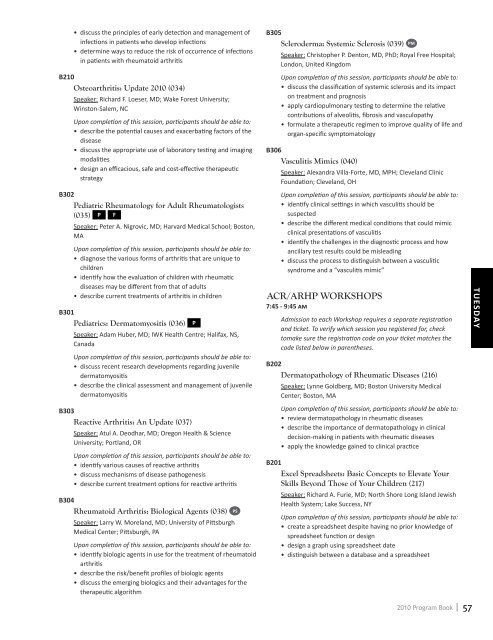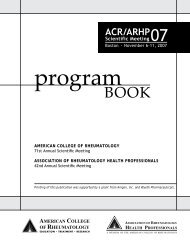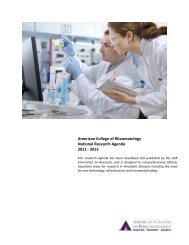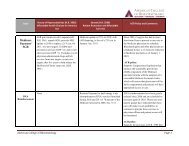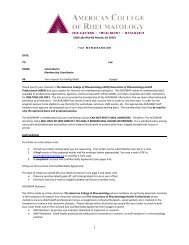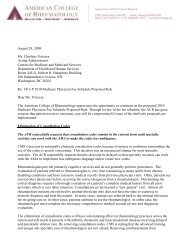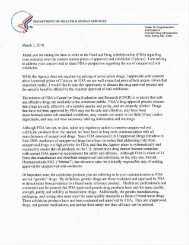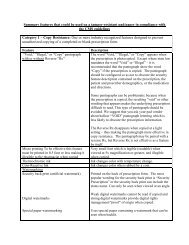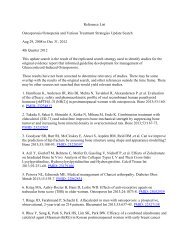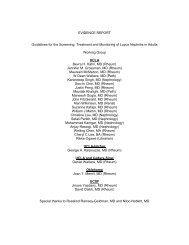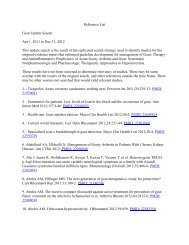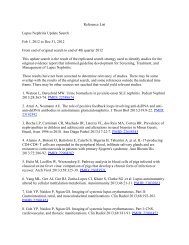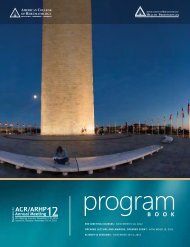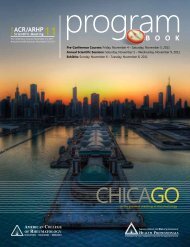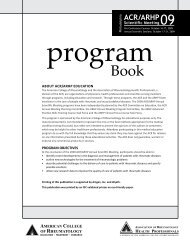B O O K - American College of Rheumatology
B O O K - American College of Rheumatology
B O O K - American College of Rheumatology
Create successful ePaper yourself
Turn your PDF publications into a flip-book with our unique Google optimized e-Paper software.
• discuss the principles <strong>of</strong> early detection and management <strong>of</strong><br />
infections in patients who develop infections<br />
• determine ways to reduce the risk <strong>of</strong> occurrence <strong>of</strong> infections<br />
in patients with rheumatoid arthritis<br />
B210<br />
Osteoarthritis: Update 2010 (034)<br />
Speaker: Richard F. Loeser, MD; Wake Forest University;<br />
Winston-Salem, NC<br />
Upon completion <strong>of</strong> this session, participants should be able to:<br />
• describe the potential causes and exacerbating factors <strong>of</strong> the<br />
disease<br />
• discuss the appropriate use <strong>of</strong> laboratory testing and imaging<br />
modalities<br />
• design an efficacious, safe and cost-effective therapeutic<br />
strategy<br />
B302<br />
Pediatric <strong>Rheumatology</strong> for Adult Rheumatologists<br />
(035) P f<br />
Speaker: Peter A. Nigrovic, MD; Harvard Medical School; Boston,<br />
MA<br />
Upon completion <strong>of</strong> this session, participants should be able to:<br />
• diagnose the various forms <strong>of</strong> arthritis that are unique to<br />
children<br />
• identify how the evaluation <strong>of</strong> children with rheumatic<br />
diseases may be different from that <strong>of</strong> adults<br />
• describe current treatments <strong>of</strong> arthritis in children<br />
B301<br />
Pediatrics: Dermatomyositis (036) P<br />
Speaker: Adam Huber, MD; IWK Health Centre; Halifax, NS,<br />
Canada<br />
Upon completion <strong>of</strong> this session, participants should be able to:<br />
• discuss recent research developments regarding juvenile<br />
dermatomyositis<br />
• describe the clinical assessment and management <strong>of</strong> juvenile<br />
dermatomyositis<br />
B303<br />
Reactive Arthritis: An Update (037)<br />
Speaker: Atul A. Deodhar, MD; Oregon Health & Science<br />
University; Portland, OR<br />
Upon completion <strong>of</strong> this session, participants should be able to:<br />
• identify various causes <strong>of</strong> reactive arthritis<br />
• discuss mechanisms <strong>of</strong> disease pathogenesis<br />
• describe current treatment options for reactive arthritis<br />
B304<br />
Rheumatoid Arthritis: Biological Agents (038) PS<br />
Speaker: Larry W. Moreland, MD; University <strong>of</strong> Pittsburgh<br />
Medical Center; Pittsburgh, PA<br />
Upon completion <strong>of</strong> this session, participants should be able to:<br />
• identify biologic agents in use for the treatment <strong>of</strong> rheumatoid<br />
arthritis<br />
• describe the risk/benefit pr<strong>of</strong>iles <strong>of</strong> biologic agents<br />
• discuss the emerging biologics and their advantages for the<br />
therapeutic algorithm<br />
B305<br />
Scleroderma: Systemic Sclerosis (039) PM<br />
Speaker: Christopher P. Denton, MD, PhD; Royal Free Hospital;<br />
London, United Kingdom<br />
Upon completion <strong>of</strong> this session, participants should be able to:<br />
• discuss the classification <strong>of</strong> systemic sclerosis and its impact<br />
on treatment and prognosis<br />
• apply cardiopulmonary testing to determine the relative<br />
contributions <strong>of</strong> alveolitis, fibrosis and vasculopathy<br />
• formulate a therapeutic regimen to improve quality <strong>of</strong> life and<br />
organ-specific symptomatology<br />
B306<br />
Vasculitis Mimics (040)<br />
Speaker: Alexandra Villa-Forte, MD, MPH; Cleveland Clinic<br />
Foundation; Cleveland, OH<br />
Upon completion <strong>of</strong> this session, participants should be able to:<br />
• identify clinical settings in which vasculitis should be<br />
suspected<br />
• describe the different medical conditions that could mimic<br />
clinical presentations <strong>of</strong> vasculitis<br />
• identify the challenges in the diagnostic process and how<br />
ancillary test results could be misleading<br />
• discuss the process to distinguish between a vasculitic<br />
syndrome and a “vasculitis mimic”<br />
ACR/ARHP Workshops<br />
7:45 - 9:45 am<br />
Admission to each Workshop requires a separate registration<br />
and ticket. To verify which session you registered for, check<br />
tomake sure the registration code on your ticket matches the<br />
code listed below in parentheses.<br />
B202<br />
Dermatopathology <strong>of</strong> Rheumatic Diseases (216)<br />
Speaker: Lynne Goldberg, MD; Boston University Medical<br />
Center; Boston, MA<br />
Upon completion <strong>of</strong> this session, participants should be able to:<br />
• review dermatopathology in rheumatic diseases<br />
• describe the importance <strong>of</strong> dermatopathology in clinical<br />
decision-making in patients with rheumatic diseases<br />
• apply the knowledge gained to clinical practice<br />
B201<br />
Excel Spreadsheets: Basic Concepts to Elevate Your<br />
Skills Beyond Those <strong>of</strong> Your Children (217)<br />
Speaker: Richard A. Furie, MD; North Shore Long Island Jewish<br />
Health System; Lake Success, NY<br />
Upon completion <strong>of</strong> this session, participants should be able to:<br />
• create a spreadsheet despite having no prior knowledge <strong>of</strong><br />
spreadsheet function or design<br />
• design a graph using spreadsheet date<br />
• distinguish between a database and a spreadsheet<br />
2010 Program Book 57<br />
tuesday


